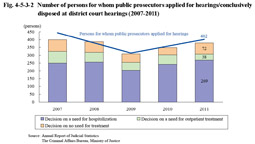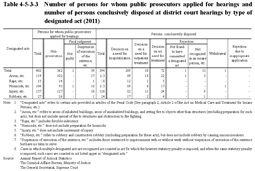1 Hearings
The medical care and treatment system for insane persons, etc. covers [1] persons who were not prosecuted although deemed to have committed the designated acts (homicide, arson, robbery, rape, forcible indecency (including attempt at these offenses), and injury) and who were considered to have been insane or of diminished capacity at the time of the act, and [2] persons found not guilty for the designated acts in the final judgment on the grounds of having been insane or given a mitigated sentence on the grounds of having had diminished capacity at the time of the act (excluding those sentenced to imprisonment with or without work without suspension of execution of the sentence and who have a specific term to serve). A hearing is held in principle for those under [1] or [2] upon application by public prosecutors. A conference consisting of a judge and a mental health expert (psychiatrist) holds the hearing and determines the necessity of medical treatment and then the details of that treatment at a district court.
Fig. 4-5-3-2 shows the number of persons for whom public prosecutors applied for hearings and the number of persons conclusively disposed at hearings over the last five years. The number of persons for whom public prosecutors applied for hearings was 402 in 2011 and the number of persons decided on a need for hospitalization or outpatient treatment 307.
Fig. 4-5-3-2 Number of persons for whom public prosecutors applied for hearings/conclusively disposed at district court hearings (2007-2011)
Table 4-5-3-3 shows the number of persons for whom public prosecutors applied for hearings and the number of persons conclusively disposed at hearings by type of designated act in 2011.
Table 4-5-3-3 Number of persons for whom public prosecutors applied for hearings and number of persons conclusively disposed at district court hearings by type of designated act (2011)
At the hearings the court can request the director of probation office to investigate the social circumstances of the subject person. The probation office then investigates the social circumstances of the subject person, including their residence and family bonds, available mental health and welfare services, etc., and reports the results to the court. The number of cases involving an investigation of the social circumstances of the subject person was 415 in 2011 (Source: Annual Report of Statistics on Rehabilitation).

